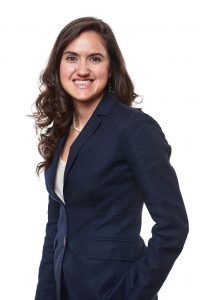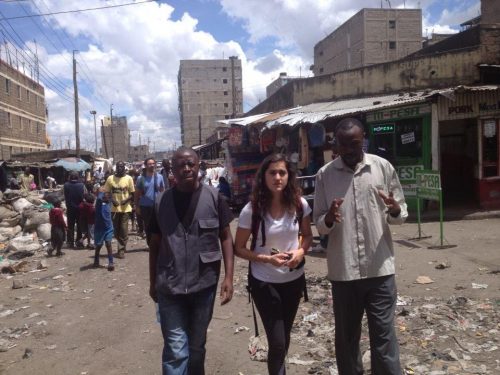Bessie Schwarz (FES ‘14) found her calling in the woods of Maine when she was 15. “I realized that what I have come to love and recognize as a beautiful part of the world was really threatened,” Schwarz said. “It won’t necessarily be around unless it is intentionally preserved.” As she drove home to suburban New Jersey, the land of concrete and highways, she decided to dedicate her future to environmental protection and advocacy. Now, as the co-founder of Cloud to Street (cloudtostreet.info)—a company that uses machine-learning techniques to predict climate change disasters—and Communications Strategist at the Yale Project on Climate Change Communication, Schwarz’s efforts have paid off.
While Schwarz was an undergraduate at Carleton College, she became a community organizer. She was the environmental senator for the student government, and she co-hosted a longform radio show called “Recycled Air” on the campus radio station. The college experience helped her reorient her vision of how to empower people to protect the environment: not only does the environment need intentional protection, she reasoned, but it also requires collective action with everyone working together. This led her to work in rural Ohio, where she rallied citizens to call their congressmen weekly about climate issues. However, as she worked on these campaigns, she quickly realized that simply rallying was not enough. “We didn’t have enough tools in the toolbox, the world was rapidly changing environmentally, and we needed to find new types of tools, strategies and innovations,” Schwarz said. She thus decided to head to Yale to obtain her Master’s degree in Environmental Studies.

While at Yale, Schwarz attended a talk by Google where she learned about the sheer amount of data and new technologies that are now available. “There is a greater wealth of data from satellites, and we now also have the computing capacity to type into a browser and access 40 years of data,” Schwarz said. After attending the talk, she felt that these tools could be used to help marginalized people who are disproportionately affected by climate change. The poor are hit hardest in weather-related disasters, and as crop yields decrease, more of the disadvantaged suffer from malnutrition. So Schwarz had an idea: she created an algorithm in Google Earth Engine to predict the effects of climate change disasters.
It started off as a fun project. While she was doing field work in rural Washington, she would spend ten hours at a time programming on her laptop. The result was an algorithm that could predict physical and social vulnerability by determining which communities are most likely to experience loss when hit by natural disasters. Beth Tellman, Schwarz’s friend at Yale FES who was specializing in hydrology, also co-wrote the algorithm by helping to predict flood water patterns.
Schwarz’s algorithm can detect flood risk in an area so that, when combined with social data, it can predict a comprehensive social vulnerability index. The result looks something like Google Earth but shows regions that are more prone to flooding and hotspots of damage that might need to be evacuated. Schwarz believes that her algorithm can inform governments and help them decrease damage from climate change disasters.
With so many disasters around us, why aren’t people taking part in the fight? Schwarz attributes this absence of involvement to a lack of effective dialogue on this issue. “The major problem with communicating climate change is that it is distant in space and distant in time. People think that it will only affect your children’s children, or people in other parts of the word,” Schwarz said. She thinks that individuals need to communicate the impacts of climate change in ways that are very personal, such as by discussing the occurrence of increased droughts and water pollution, or the impacts climate change will have on the refugee crisis. Talking to friends and family may seem trivial, but Schwarz believes this is the most important way of engaging the community.
Looking to the future, Schwarz hopes that her work can help more people as we experience more extreme weather conditions caused by climate change. “Exposure to inland flooding alone is expected to double by the year 2030. We don’t know how to take care of the hundreds of thousands of people affected today by these disasters, and we live in a very exciting moment, deciding how we want to re-govern the world,” Schwarz said.

